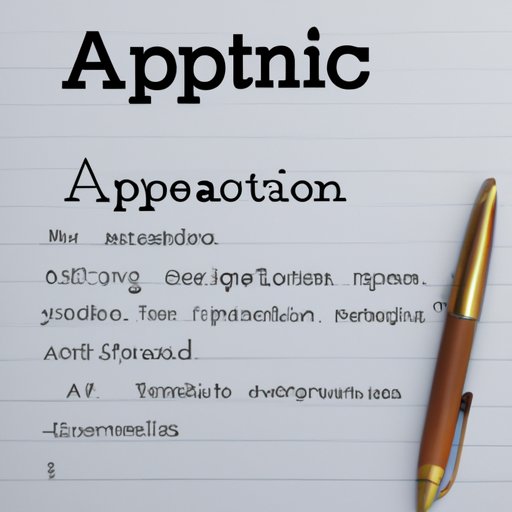Introduction
Appeal writing is a form of communication used to dispute an unfavorable decision or outcome. It involves the art of crafting persuasive letters in order to convince a third party to reconsider their position. This type of writing requires a thorough understanding of the facts and legal principles involved in the case. Additionally, it requires the ability to present arguments in a compelling way that can convince the reader to change their mind.
The purpose of this article is to provide a comprehensive overview of appeal writing, from understanding what an appeal is to crafting an effective appeal letter that gets results. We will explore the basics of appeal writing and discuss the different types of appeals, as well as provide tips and strategies for making a powerful argument.

Exploring the Basics of Appeal Writing
Before diving into the art of crafting an effective appeal letter, it is important to understand the basics of appeal writing. What exactly is an appeal and why should you consider writing one? Let’s explore these questions further.
Understanding What an Appeal Is
An appeal is a formal request to overturn or modify a decision that has been made by a court, administrative agency, or other judicial body. It is typically written by an individual or organization that is dissatisfied with the outcome of a case and believes that the court, administrative agency, or other judicial body made an error in its ruling or interpretation of the law.
Common Reasons for Writing an Appeal
There are several common reasons for writing an appeal. These include:
- To challenge an unfavorable court ruling
- To challenge an unfavorable ruling by an administrative agency
- To challenge an unfavorable ruling by a governmental body
- To challenge an unfavorable decision by a school or university
- To challenge an unfavorable decision by an employer
Who Should Write an Appeal
Anyone who is dissatisfied with the outcome of a case and believes that a mistake was made in the ruling or interpretation of the law can write an appeal. It is important to note, however, that appeals should only be written if there is a reasonable chance that the desired outcome can be achieved. It is not advisable to file an appeal simply to delay or prolong the process.

The Art of Crafting an Effective Appeal Letter
Writing an effective appeal letter requires skill, knowledge, and attention to detail. It is important to research your case thoroughly and present your argument in a persuasive manner. Here are some tips for crafting an effective appeal letter:
Researching Your Case
Before writing an appeal, it is important to research your case thoroughly. This means collecting all relevant documents and evidence that support your argument. It is also important to review the legal principles involved in the case and be familiar with any applicable laws or regulations.
Writing an Engaging Opening Statement
The opening statement of an appeal letter should be concise and engaging. It should clearly state the purpose of the letter and provide a brief summary of the argument that will be presented. The opening statement should also set the tone for the rest of the letter.
Outlining Your Argument
Once the opening statement is written, the next step is to outline your argument. This should include a detailed explanation of why you believe the court, administrative agency, or other judicial body made an error in its ruling or interpretation of the law. Be sure to provide clear and convincing evidence to support your argument.
Including Supporting Evidence
In addition to outlining your argument, it is important to include supporting evidence. This could include documents, photographs, witness statements, expert opinions, or other forms of evidence that support your argument. Be sure to cite any sources that you use.
Making a Clear Request
The goal of an appeal letter is to persuade the recipient to change their decision. Therefore, it is important to make a clear and specific request in the letter. Explain what action you would like the recipient to take and why it is justified.
Closing Your Appeal
Finally, it is important to close your appeal in a professional and respectful manner. Thank the recipient for their time and consideration, and reiterate your request. Be sure to include contact information so that the recipient can reach out with any questions or concerns.
A Beginner’s Guide to Writing an Appeal
If you are new to appeal writing, here is a beginner’s guide to help get you started:
Gather Necessary Documentation
The first step is to gather all necessary documents and evidence that support your argument. This includes all relevant court documents, legal briefs, expert opinions, witness statements, and any other forms of evidence that you plan to use in your appeal.
Choose the Appropriate Format
The format of an appeal letter should be professional and easy to read. Consider using a standard business letter format, which includes a heading, salutation, body text, closing, and signature. Additionally, be sure to check the rules of the court or governing body to ensure that your letter adheres to any formatting requirements.
Understand the Structure of an Appeal Letter
It is important to understand the structure of an appeal letter. This includes the opening statement, argument, evidence, request, and closing. Each section should be written in a clear and organized manner, and should include all necessary information.

Understanding the Different Types of Appeals
There are several different types of appeals. Here is a brief overview of the most common types of appeals:
Academic Appeals
Academic appeals are written to challenge an unfavorable decision made by a school or university. This could include decisions regarding admissions, grades, disciplinary action, or financial aid. Academic appeals should include a detailed explanation of why the decision was wrong and provide any evidence that supports the argument.
Administrative Appeals
Administrative appeals are written to challenge an unfavorable decision made by an administrative agency. This could include decisions regarding taxes, licenses, permits, or other government-related matters. Administrative appeals should include a detailed explanation of why the decision was wrong and provide any evidence that supports the argument.
Legal Appeals
Legal appeals are written to challenge an unfavorable court ruling. This could include decisions regarding civil or criminal cases. Legal appeals should include a detailed explanation of why the decision was wrong and provide any evidence that supports the argument.
Tips for Writing a Powerful Appeal
In order to write a powerful appeal, it is important to use persuasive language, maintain professionalism, and show respect. Here are some tips to keep in mind:
Use Persuasive Language
When writing an appeal, it is important to use persuasive language that conveys your argument in a compelling manner. Be sure to use clear and concise sentences, and avoid using overly technical language. Additionally, focus on the facts and avoid personal attacks.
Maintain Professionalism
It is important to maintain a professional tone throughout the letter. Avoid using inflammatory language, and be sure to remain courteous and respectful. This will demonstrate to the recipient that you are taking the matter seriously and that you are committed to finding a resolution.
Show Respect
Finally, it is important to show respect for the recipient and the decision-making process. Acknowledge the recipient’s authority and thank them for their time and consideration. This will demonstrate that you are serious about your argument and that you understand the gravity of the situation.
Common Mistakes to Avoid When Writing an Appeal
When writing an appeal, it is important to avoid certain mistakes. Here are some common mistakes to avoid:
Not Following the Rules
Be sure to follow all rules and guidelines for submitting an appeal. This includes any formatting requirements, deadlines, or other instructions that have been provided. Failure to follow the rules could result in your appeal being rejected or ignored.
Inaccurate Information
It is important to make sure that all information included in the appeal is accurate. Double-check all facts and figures, and make sure that any evidence cited is reliable. Inaccurate information could weaken your argument and lead to a dismissal of your appeal.
Poor Grammar and Spelling
Finally, it is important to proofread your appeal for any grammar or spelling errors. Poor grammar and spelling can give the impression that you are unprofessional or careless. Be sure to double-check your work and have someone else review it before submitting.
Crafting an Engaging Appeal That Gets Results
Writing an effective appeal letter can be challenging, but with the right approach, it is possible to craft an engaging appeal that gets results. Here are some tips to keep in mind:
Focus on the Positive
When writing an appeal, it is important to focus on the positive. Rather than dwelling on the negative aspects of the case, focus on the facts and evidence that support your argument. This will help to create a more persuasive argument.
Offer Solutions
In addition to presenting your argument, it is important to offer solutions. Explain how the recipient can resolve the issue in a fair and equitable manner. This will demonstrate that you are willing to work together to find a resolution.
Be Patient
Finally, it is important to be patient. The appeals process can take time, and it may be necessary to submit multiple appeals before a resolution is reached. Be sure to follow up with the recipient regularly to check on the status of your appeal.
Conclusion
Appeal writing is a complex process that requires skill, knowledge, and attention to detail. It is important to understand the basics of appeal writing, as well as the different types of appeals and how to craft an effective appeal letter. Additionally, it is important to use persuasive language, maintain professionalism, show respect, and offer solutions when writing an appeal. By following these tips, you can craft an engaging appeal that gets results.
(Note: Is this article not meeting your expectations? Do you have knowledge or insights to share? Unlock new opportunities and expand your reach by joining our authors team. Click Registration to join us and share your expertise with our readers.)
